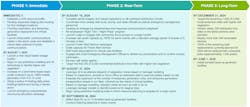CenterPoint CEO Announces Action Plans to Build Most Resilient Coastal Grid and Improve Hurricane Preparedness and Response
Today, at a hearing before the Public Utility Commission of Texas, CenterPoint President and CEO Jason Wells apologized for the frustration Houstonians experienced during Hurricane Beryl and made a company-wide commitment to improve. In the hearing, Wells, accompanied by Tony Gardner, SVP and chief customer officer, and Randy Pryor, VP Major Underground & Distribution Modernization, announced an initial series of specific actions that will increase the resiliency of the electric system, improve customer communications, and strengthen emergency response coordination and partnerships.
“There are no excuses. We will get better. We are taking immediate action to make real, measurable and positive changes to not only better serve our customers and the community, but to re-earn their trust," Jason Wells said. “Our mission is to build and operate the most resilient coastal grid anywhere in the country with best-in-class communications."
CenterPoint's plan of action, which focuses on three classes of priorities, was submitted to the PUC and details a series of initial actions that the company will take both immediately and long-term, including:
- Resiliency Investments: By accelerating adoption of the latest construction standards, retrofitting existing assets on an accelerated basis, and using predictive modeling, AI and other advanced technologies, CenterPoint will harden its distribution system and speed restoration. The company will also take action to protect its electrical assets by nearly doubling the size of its vegetation management crews and targeting higher risk vegetation to address the number one cause of damage and outages in Hurricane Beryl.
- Best-in-Class Customer Communications: To ensure customers have the information they need, when they need it, CenterPoint will launch a new and more customer-oriented outage tracker by August 1. This online tool will provide better and more complete information during storms and is designed to handle increased demand during such events.
- Strengthened Partnerships: Effective emergency preparedness and response requires close coordination with government officials. CenterPoint will hire a seasoned emergency response leader to help the company rapidly accelerate its planning capabilities and develop close community partnerships to ease the burden of storm events on more vulnerable communities.
The following are key excerpts from Wells' remarks, as prepared, given before the Public Utility Commission of Texas.
“In times of emergency, our responsibility is to respond quickly, to communicate clearly, to provide accurate information, and to restore power as rapidly and as safely as we can. I take personal accountability for areas where we fell short of our customers' expectations. I also want to apologize for the frustration we caused our customers. We will do better."
“While we cannot erase the frustrations and difficulty so many of our customers endured, I, and my entire leadership team, will not make any excuses. We will improve and act with a sense of urgency."
“I commit that starting immediately, we will improve our communications with customers and will take specific actions to become the most resilient coastal grid in the country. Our pillars of action fall into three categories: (1) improvements in resiliency, (2) improvements in communications, and (3) greater collaboration with our local partners and emergency responders."
“Going forward, our most important priority today and in the months ahead will be to improve our emergency response with a sense of urgency to re-earn your trust, and the trust of the millions of people who depend on us."
“Our company and the thousands of men and women of CenterPoint will remain tireless in our efforts to strengthen our system and better serve the community we are all proud to call home."

